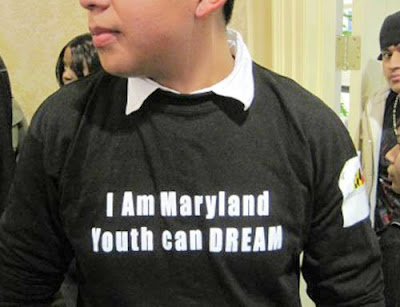
Maryland DREAM Act rallied in Baltimore outside the Fallon Federal Building, which houses the local office of the United States Citizenship and Immigration Services. In Spanish and English, the speakers told their stories. Brought to the United States as children some before their second birthday they settled into their American life.One young woman, a senior at an Anne Arundel County public high school, recalled her childhood in the States, including sleeping in public parks with her mother. Despite the disadvantages she faced, she is set to graduate from high school and wants to pursue a career in genetics. (Luckily, Maryland is the site of academic institutions, the National Institutes of Health and privately funded corporations that research genetics, to the betterment of all.)This young woman simply needs the chance to combine her ambition with the opportunities available right here in Maryland: award-winning public higher education and a built-in science and technology job market. She is, however, what some call an illegal immigrant. In her words, she is "undocumented and unafraid."
I fear her dreams of further education and a career in science will elude her. Currently, undocumented students are required to pay out-of-state tuition rates at Maryland's public higher education institutions. The difference between the tuition rates is a significant roadblock. For example, the 2012-2013 in-state tuition (plus technology fee) at the University of Maryland is $8,908.92 for a full-time undergraduate student, while the out-of-state cost is $27,287.92.Fortunately, our legislature passed the Maryland DREAM Act, which gives deserving undocumented students a chance at a college education by paying in-state tuition rates. But the DREAM Act has been put up for a referendum vote in November.
The act contains strict requirements to ensure the state is not providing in-state tuition to those recent to Maryland who are without a history of filing income tax returns with the state. Our representatives passed a version of the DREAM Act that recognized the fundamental fairness of providing our young people with an affordable education and the reality that tax coffers do not fill themselves.The debate over the DREAM act is beyond partisanship. Indeed, Texas Gov. Rick Perry, a recent candidate for the Republican presidential nomination, discussing the Texas version of the DREAM Act, told the New Hampshire Union Leader in June 2011 that "[t]o punish these young Texans for their parents' actions is not what America has always been about."
The Maryland DREAM Act first allows undocumented students to pay in-county tuition at community colleges in our state. The students may only receive in-county tuition if they register at community colleges within four years of receiving their Maryland high school diploma or equivalent and meet the following requirements: attend a Maryland high school for three years; graduate or receive an equivalent of a diploma from a Maryland high school; provide documentation that their parents or legal guardians filed Maryland income tax returns for the three years that the student attended the Maryland high school and for all years that they attend the community college; swear to receive proper documentation as soon as eligible (students must provide an affidavit that they will file an application for permanent residency within 30 days of eligibility to do so); and register for Selective Service (for male students).
After a student receives an associate's degree or 60 credit hours from a community college, he or she becomes eligible for in-state tuition at a four-year Maryland university. While the students are eligible for in-state tuition at that point, they, according to law, "may not be counted as in-state student for the purposes of determining the number of Maryland undergraduate students enrolled" at the public university. In other words, they will not get preference over native-born students.The law is not a giveaway to illegal immigrants. The Maryland DREAM Act simply allows all Maryland children to be eligible for in-state tuition. The undocumented student must prove herself and compete with non-Maryland students for a spot at a public, Maryland four-year university of her choice. The DREAM Act students who make it to that point must then pay the full freight in-state tuition regardless of their economic background.After meeting these strict requirements and receiving a college education in Maryland, the DREAM Act students will have the academic tools necessary to meet their full potential. Maybe one of them will produce the next bio-genetic breakthrough, benefiting you and me and all of us.

+tactical+missile+system.+INFOgraphics.jpg)

The DREAM Act seeks to protect young people that were brought to the country by no fault of their own. The U.S. has become their home. They should be able to continue their education in order to achieve better opportunities in the future.
ReplyDelete